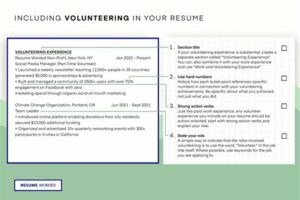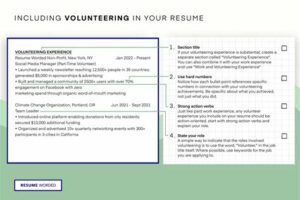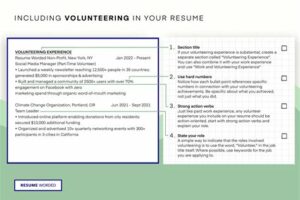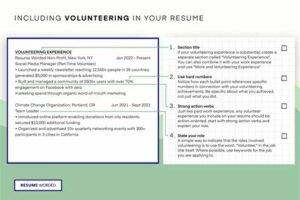Table of Contents
Discover how volunteering can enhance your skills for the working world. Gain experience in teamwork, communication, problem-solving, and leadership while making a positive impact. Learn how to adapt to diverse environments and cultivate a strong work ethic. Volunteer today and pave your way to a successful career!
Volunteering goes beyond the act of giving back to the community; it is a powerful tool that can significantly enhance one’s skills for the working world. Whether you are a fresh graduate seeking your first job or a seasoned professional looking to acquire additional expertise, volunteering offers an exceptional opportunity to develop and refine various abilities that are highly valued in today’s competitive job market. From enhancing communication and teamwork skills to gaining valuable industry experience, the benefits of volunteering are boundless. In this article, we will explore how volunteering can help individuals grow both personally and professionally, equipping them with the necessary skills for success in the working world.
Introduction
Volunteering is a valuable activity that not only benefits the community but also offers numerous advantages for personal and professional growth. Engaging in volunteer work allows individuals to develop essential skills that are highly sought after in the working world. Whether you are a student, a job seeker, or already employed, volunteering can provide you with unique opportunities to enhance your skillset and improve your chances of success in your career.
Leadership Skills
Volunteering often presents individuals with leadership opportunities they may not encounter in their regular jobs. Taking charge of a project or leading a team of volunteers can help you develop strong leadership skills. You will learn how to delegate tasks, make informed decisions, motivate others, and effectively communicate your vision. These skills are highly valued by employers and can greatly boost your employability.
Teamwork and Collaboration
Working as part of a team is a fundamental aspect of most professional environments. Volunteering provides an excellent platform to enhance your teamwork and collaboration skills. By engaging in group projects, you will learn how to cooperate with diverse individuals, resolve conflicts, and achieve common goals. These experiences will make you a valuable asset to any organization, as employers highly value employees who can work effectively with others.
Communication and Interpersonal Skills
Volunteering often involves interacting with a diverse range of people, including fellow volunteers, staff members, and community members. This gives you ample opportunities to hone your communication and interpersonal skills. Through volunteering, you can improve your ability to listen actively, express yourself clearly, and adapt your communication style to different audiences. These skills are vital in the professional world, where effective communication is essential for building strong relationships with colleagues, clients, and stakeholders.
Problem-Solving and Adaptability
Volunteering can expose you to various challenges and situations that require quick thinking and problem-solving skills. As a volunteer, you may encounter unexpected obstacles or face limited resources, requiring you to think creatively and find innovative solutions. This fosters your ability to adapt to new circumstances and think critically, which are highly valuable skills in the workplace. Employers appreciate individuals who can effectively navigate through challenges and come up with practical solutions.
Time Management
Effective time management is crucial for both personal and professional success. Volunteering often demands commitment and requires individuals to juggle their volunteer work alongside other responsibilities. By engaging in volunteer activities, you can develop excellent time management skills. You will learn how to prioritize tasks, set realistic deadlines, and efficiently allocate your time. These skills can greatly enhance your productivity and make you an asset in any work environment.
Networking Opportunities
Volunteering exposes you to a wide range of people from different backgrounds and professions. This presents excellent networking opportunities that can be invaluable for your future career. Building connections with fellow volunteers, staff members, and community leaders can open doors to new job prospects, mentorship opportunities, and professional development. Networking is a key aspect of professional growth, and volunteering provides a conducive environment to expand your professional network.
Industry-Specific Skills
Volunteering allows individuals to gain industry-specific skills and knowledge that can be directly applicable to their desired career paths. For example, volunteering at a hospital can provide valuable insights into the healthcare industry, while volunteering at an animal shelter can develop skills relevant to veterinary or animal care professions. These experiences can demonstrate your dedication and passion for a particular field, making you a competitive candidate when applying for related job roles.
Enhanced Self-Confidence
Engaging in volunteer work can significantly boost your self-confidence and self-esteem. As you contribute to meaningful projects and witness the positive impact of your efforts, you will gain a sense of accomplishment and fulfillment. This newfound confidence can translate into various aspects of your professional life, allowing you to tackle challenges with greater resilience and assertiveness.
Experience and References
Volunteering provides valuable experience that can strengthen your resume and make you stand out to potential employers. It demonstrates your willingness to go above and beyond, showcases your diverse skillset, and highlights your commitment to making a difference. Additionally, volunteering can provide you with references from supervisors or colleagues who can vouch for your work ethic, skills, and character. These references can be highly influential in securing future employment opportunities.
Conclusion
Volunteering offers a multitude of benefits, including the development of essential skills for the working world. By engaging in volunteer work, you can enhance your leadership, teamwork, communication, problem-solving, time management, and industry-specific skills. Additionally, volunteering provides networking opportunities, boosts self-confidence, and offers valuable experience that can enhance your resume. So, consider dedicating some of your time to volunteering and reap the rewards of personal and professional growth.
How Volunteering Can Help Develop Skills for Working Life
Volunteering is not only a way to give back to the community, but it also offers numerous benefits for personal and professional development. Engaging in volunteer activities provides individuals with opportunities to enhance their communication skills, develop leadership qualities, improve time management and prioritization, cultivate adaptability and flexibility, sharpen problem-solving and critical thinking abilities, foster teamwork and collaboration, expand their network through relationship building, and increase self-confidence and empathy. These skills are highly transferable to the workplace, where effective communication, leadership, time management, adaptability, problem-solving, teamwork, networking, and emotional intelligence are essential for success.
Enhanced Communication Skills
Volunteering exposes individuals to diverse individuals and communities, allowing them to interact with people of different ages, backgrounds, and personalities. Through these interactions, volunteers can develop effective verbal and nonverbal communication techniques. Engaging with diverse groups helps individuals express their ideas clearly and confidently. In the workplace, effective communication is crucial for teamwork and success, making these enhanced communication skills invaluable.
Leadership and Initiative
Volunteering often involves taking on leadership roles and demonstrating initiative. Whether it’s organizing events, coordinating teams, or managing projects, volunteers learn to navigate challenges, make decisions, and motivate others. This experience builds crucial leadership qualities that are transferable to a professional setting. It encourages individuals to take ownership of their work, inspire colleagues, and drive positive change within the organization.
Time Management and Prioritization
Volunteering demands effective time management and prioritization skills to handle multiple tasks and responsibilities efficiently. Volunteers learn to juggle commitments, meet deadlines, and allocate resources effectively, honing their ability to stay organized and focused. These skills directly translate to the workplace, equipping individuals with the capacity to manage their workload, meet project milestones, and maintain productivity.
Adaptability and Flexibility
Volunteering exposes individuals to a variety of situations that require adaptability and flexibility. Volunteers learn to navigate unfamiliar environments, work with diverse teams, and address unforeseen challenges, ultimately cultivating resilience and adaptability. These traits are highly sought after in the workplace, where professionals must quickly adapt to changing circumstances, embrace new technologies, and embrace different perspectives to thrive in dynamic and evolving industries.
Problem Solving and Critical Thinking
Volunteering often presents volunteers with complex issues and problems that require innovative solutions. Through hands-on experience, individuals develop problem-solving and critical thinking skills. They learn to analyze situations, evaluate options, and implement effective strategies. These abilities are transferable to the professional world, where employees are constantly faced with challenges and must think critically to overcome obstacles and achieve goals.
Teamwork and Collaboration
Volunteering provides opportunities to work within diverse teams, fostering essential teamwork and collaboration skills. Volunteers learn to communicate effectively, share responsibilities, and leverage individual strengths to achieve common objectives. These experiences enhance interpersonal skills such as empathy, active listening, and conflict resolution, which are essential in a collaborative work environment.
Networking and Relationship Building
Engaging in volunteer activities allows individuals to expand their network and build relationships with people from various industries and backgrounds. This networking provides valuable connections that can lead to potential professional opportunities, such as job referrals, mentorship, or partnerships. Volunteering facilitates relationship building, helping individuals develop strong interpersonal skills that can positively impact their career progression.
Increased Self-Confidence and Empathy
Volunteering promotes personal growth and self-confidence by challenging volunteers to step out of their comfort zones and contribute to meaningful causes. Through acts of compassion and empathy, individuals gain a deeper understanding of others’ experiences and develop a heightened sense of empathy. This increased self-confidence and empathy provide a strong foundation for professional success, empowering individuals to connect with colleagues, solve problems effectively, and demonstrate emotional intelligence in the workplace.
In conclusion, volunteering offers numerous benefits for personal and professional development. It enhances communication skills, develops leadership qualities, improves time management and prioritization, cultivates adaptability and flexibility, sharpens problem-solving and critical thinking abilities, fosters teamwork and collaboration, expands networks through relationship building, and increases self-confidence and empathy. These skills are highly valued in the workplace, making volunteering an excellent opportunity for individuals to develop the necessary skills for success in their working lives.
In today’s competitive job market, employers are not only looking for candidates with the right qualifications and experience, but also those who possess a range of skills that can contribute to their organization’s success. One way individuals can develop these skills is through volunteering. Volunteering not only allows individuals to contribute to a good cause, but it also provides them with numerous opportunities to develop essential skills that are highly valued in the working world.
Here are several ways in which volunteering can help develop skills for working life:
- Leadership and Management Skills: Volunteering often presents individuals with the opportunity to take on leadership roles or manage teams. This experience allows them to develop crucial skills such as decision-making, problem-solving, and team-building. These skills are highly transferable to the workplace and demonstrate an individual’s ability to take charge and effectively guide others towards a common goal.
- Communication and Interpersonal Skills: Volunteering involves interacting with a diverse range of individuals, including fellow volunteers, beneficiaries, and community members. Through these interactions, individuals can enhance their communication and interpersonal skills. They learn how to effectively convey information, listen attentively, and collaborate with others. These skills are invaluable in a professional setting, where effective communication and teamwork are essential.
- Time Management and Organization: Volunteering often requires individuals to juggle multiple tasks and responsibilities within limited timeframes. This experience helps individuals develop strong time management and organizational skills. They learn how to prioritize tasks, set goals, and meet deadlines efficiently. These skills are vital in the workplace, where meeting project deadlines and managing workloads are essential for success.
- Adaptability and Flexibility: Volunteering can expose individuals to various challenging situations and environments. They learn how to adapt to new circumstances, think on their feet, and remain flexible in their approach. These skills are highly valued by employers, as they demonstrate an individual’s ability to thrive in a fast-paced and ever-changing work environment.
- Problem-solving and Critical Thinking: Volunteering often presents individuals with complex problems that require innovative solutions. By engaging in volunteer work, individuals can enhance their problem-solving and critical thinking skills. They learn how to analyze situations, identify root causes, and develop effective strategies to overcome challenges. These skills are crucial in the workplace, where individuals are often required to find creative solutions to various problems.
In conclusion, volunteering offers individuals a unique opportunity to develop a wide range of skills that are highly sought after in the working world. From leadership and communication skills to time management and problem-solving abilities, the experiences gained through volunteering can significantly contribute to an individual’s professional growth and success. Thus, individuals should consider volunteering not only as a means of giving back to the community but also as a way to enhance their skills and increase their chances of securing rewarding employment opportunities.
Thank you for taking the time to visit our blog and explore the topic of how volunteering can help develop skills for working life. We hope you have found the information and insights shared in this article valuable and motivating. As you continue your journey towards personal and professional development, we encourage you to consider the immense benefits that volunteering can offer in shaping your skills and abilities.
Firstly, volunteering provides a unique opportunity to enhance your communication skills. Whether you are working with a team of fellow volunteers or interacting with individuals from diverse backgrounds, effective communication is essential. Through volunteering, you can practice active listening, learn to express yourself clearly, and develop empathy and understanding. These skills are not only valuable in the workplace but also in all aspects of life, enabling you to build strong relationships and collaborate effectively with others.
Secondly, volunteering allows you to develop valuable leadership and problem-solving skills. When you volunteer, there may be situations where you need to take charge, make decisions, and find innovative solutions to challenges. This experience helps you build confidence in your abilities to lead and make informed choices. Moreover, by volunteering in different roles or projects, you can develop adaptability and resilience, which are vital skills in today’s fast-paced and ever-changing work environments.
Lastly, volunteering offers an excellent platform for building and expanding your professional network. As you engage with like-minded individuals, community leaders, and professionals in various fields, you have the opportunity to create meaningful connections. These connections can open doors to new career opportunities, mentorship, and valuable advice. Additionally, by volunteering in organizations related to your field of interest, you can gain exposure to industry professionals who can provide valuable insights and guidance, further enhancing your career prospects.
In conclusion, volunteering not only benefits the communities and causes you support, but it also plays a significant role in developing skills that are highly sought-after in the working world. The communication, leadership, problem-solving, and networking skills gained through volunteering can give you a competitive edge and help shape your professional journey. We encourage you to take the initiative and explore volunteering opportunities that align with your passions and goals. Start making a difference today while investing in your own personal growth and future success!
Thank you once again for visiting our blog, and we wish you all the best in your endeavors.
.
How Volunteering Can Help Develop Skills For Working Life
Volunteering is not only a selfless act of giving back to the community, but it also offers numerous benefits for personal and professional growth. Engaging in volunteer work can significantly contribute to developing essential skills that are highly valued in the working world. Here are some common questions people ask about how volunteering can help develop skills for working life:
What are the skills gained through volunteering?
Volunteering can help individuals acquire a wide range of skills, including:
- Communication and interpersonal skills
- Leadership and teamwork abilities
- Problem-solving and critical thinking
- Time management and organizational skills
- Adaptability and flexibility
- Initiative and self-motivation
- Emotional intelligence and empathy
- Project planning and management
- Networking and relationship building
How does volunteering enhance communication and interpersonal skills?
Volunteering involves interacting with diverse groups of people, which helps improve communication and interpersonal skills. Volunteers often collaborate with team members, coordinate with supervisors, and engage with the community they serve. These interactions provide valuable opportunities to practice active listening, empathy, conflict resolution, and effective verbal and non-verbal communication.
Can volunteering develop leadership skills?
Absolutely! Many volunteer roles offer opportunities to take on leadership responsibilities. Volunteers can lead teams, organize events, manage projects, and make independent decisions. By volunteering in leadership positions, individuals can enhance their ability to motivate others, delegate tasks, solve problems, and make informed decisions – all of which are vital leadership skills sought by employers.
How does volunteering improve problem-solving and critical thinking?
Volunteering often involves facing challenges and finding innovative solutions to address them. Whether it’s determining the best approach to meet the needs of a community or resolving conflicts within a team, volunteers learn to think critically and solve problems efficiently. These experiences cultivate adaptability, creativity, analytical thinking, and resourcefulness – key qualities highly valued in the workplace.
Can volunteering help with time management and organizational skills?
Volunteer work requires individuals to juggle multiple responsibilities and prioritize tasks effectively. By managing their time efficiently, volunteers learn to meet deadlines, handle various commitments, and balance their personal and professional lives. These experiences develop strong time management and organizational skills that are transferable to any work setting.
Engaging in volunteer work not only benefits the community but also provides individuals with a platform to develop and refine crucial skills for their working lives. The skills gained through volunteering can significantly enhance employability, contribute to career advancement, and make individuals more well-rounded professionals.






